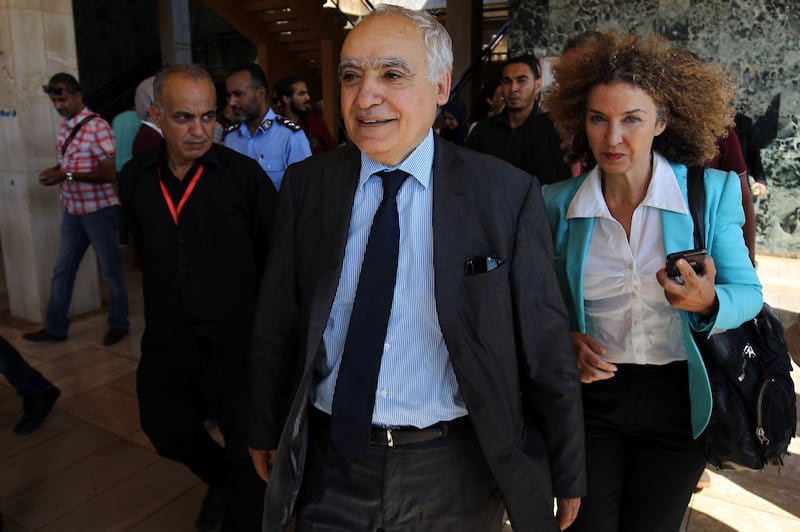Newly-installed United Nations Libya envoy Ghassan Salame was in Cairo on Monday for the latest round of high-level discussions with the Egyptian leadership on resolving the Libyan crisis.
Mr Salame, a former Lebanese political sciences professor based in Paris, joins a long line of previous successors hoping to stem the country’s political gridlock, which has been exacerbated by the country's patchwork of unruly militias.
His Monday meetings in Egypt came just hours after former Libyan prime minister Ali Zeidan, who served in the elected post between 2012 and 2014, was detained in Tripoli by the Tripoli Revolutionaries Brigade militia on an outstanding warrant. The so-called "arrest", which took place overnight, was the second time Mr Zeidan had effectively been kidnapped from a hotel and underscores a fragile political landscape dominated by tribalism and patronage from other Arab nations.
The political hopes of a wide range of players, including the United States, are pinned on Mr Salame’s efforts. But Egypt is not a neutral broker in the negotiations, according to observers of Libya.
Read more: New UN envoy to Libya faces major challenge in bringing peace
“Egypt has been engaged militarily in Libya: Cairo has supported Libya’s counterrevolutionary camp led by [Field Marshal] Khalifa Haftar in a clear, one-sided manner from the start. So it is difficult for Egypt to be neutral”, said Jalel Harchaoui, an academic who researches Libya’s geopolitical fissures at Paris 8 University.
Field Marshal Haftar is the commander of the Libyan National Army, which is aligned with the elected House of Representatives parliament in the east of the country. A rival UN-backed administration is based in Tripoli.
Egyptian president Abdel Fatah El Sisi has consistently praised Field Marshal Haftar for his leadership against Islamist militants who control wide swathes of eastern and southern Libya.
Cairo, which has a large labour force of around 750,000 nationals who work in Libya, bombed militants targets in the eastern Libyan city of Derna in May in response to attacks targeting Coptic Christians during Palm Sunday celebrations.
Mr Harchaoui was hopeful Mr Salame’s diplomatic background could be a positive factor in the latest talks but was pessimistic about any real progress being made.
This experience, he said, “doesn’t necessarily mean Egypt and the UN special envoy Ghassan Salame are in a position to work together constructively and help Libya make headway towards peace".
The National reached out to several Libyan officials from various factions for comment but they were unavailable for a response.
Field Marshal Haftar's political standing in Libya has also been bolstered by direct support from Russia. On Monday, the commander met with Russian foreign minister Sergey Lavrov with the latter signalling Moscow's willingness to cement its presence in the region.
Read more: Libyan military commander to discuss peace process in Moscow
The UN-backed government of prime minister Fayez Al Sarraj in Tripoli has struggled to assert its authority amid Libya's chaotic political landscape and been thwarted by Field Marshal Haftar’s hard bargaining. Mr Al Sarraj recently met with US ambassador to Libya Peter Bodde to raise issues of security.
But when pressed on Monday about the possible expansion of the US military role in Libya, Africom spokesperson Samantha Reho said only that “there is a small number of US forces who have gone in and out of Libya to exchange information with local forces and they will continue to do so as we strengthen the fight against ISIS and other terrorist organisations”.
Mr Bodde, alongside General Thomas Waldhauser of the US African Command (Africom), has also met with Mr Salame and the Egyptian armed forces chief of staff Mahmoud Hegazy. Mr Hegazy met with Mr Salame after his arrival in Egypt on Sunday to brief him on Cairo's "brokering role" in Libya "under the umbrella of the United Nations”.
Mr Harchaoui said, however, that the suggestion of a substantial Egyptian role in mediating the Libyan crisis was nothing more than rhetoric.
“When it comes to Egypt’s role in the Libyan conflict, progress towards an authentic political deal is possible, but it is not probable," he said. "I do not expect a breakthrough.”
Read more: Algeria and Egypt say Libya crisis should be resolved internally
The academic advocated a more nuanced political approach to the crisis that took into account how Libyans are suffering rather than one viewed solely through a security prism. Unicef said last week that more than half a million Libyan children were in urgent need of humanitarian assistance due to the political instability."Too many states have adopted a securitised, exclusionary approach to the Libyan morass," Mr Harchaoui said. But "that's a dangerous temptation".
"I hope Egypt will prove me wrong this time around."





